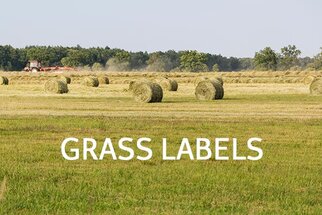The new grass labels allow users to also apply special sustainability requirements to labels. The production of such grass papers is based on special grass pellets developed and patented by a German company from the Rhineland.
In this process, grass fibres are processed mechanically, requiring no chemicals. Compared to wood pulp processing, this results in energy savings of 97 percent and water savings of 99 percent. As the grass originates from domestic compensation areas, logistics expenses are also minimized, resulting in CO2 savings of up to 75 percent. In the end product grass paper, CO2 savings amount to a considerable sum of 20 to 25 percent.
Excellent printability
The new grass label contains to a large extent this very sustainable resource. In principle, it can be processed like a conventional label and offers very good printability in offset and flexo printing. As it is a natural product, its colour can vary, but combined with the material’s somewhat rougher surface, this immediately and credibly signals to the consumer that this is sustainable packaging material.
An additional advantage: the grass paper contains no allergens that are subject to EU labelling requirements listed in the regulation (EU) 1169/2011, such as fish or nut products. Therefore, grass paper labels are ideally suited for use with food and cosmetics.
Proven sustainability
By now, the environmental benefit of grass paper has been backed by science: “Within the framework of this comparative life cycle assessment, grass-based cellulose performs considerably better than the alternatives wood-based sulphate cellulose and recycled fibre – in terms of energy and water consumption, acidification potential, and emissions balance”, say the authors of a 2017 life cycle assessment created by the International Centre for Sustainable Development in Sankt Augustin, Germany.
“In particular, the low fuel and energy consumption during production resulting from short transport distances is decisive for the environmental benefit of grass paper.” The grass can, for instance, be grown on ecological compensation areas relatively close to the paper mills – thereby, it does not compete against food cultivation.
